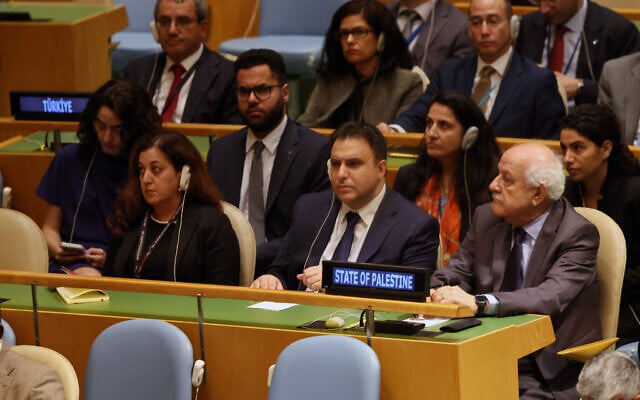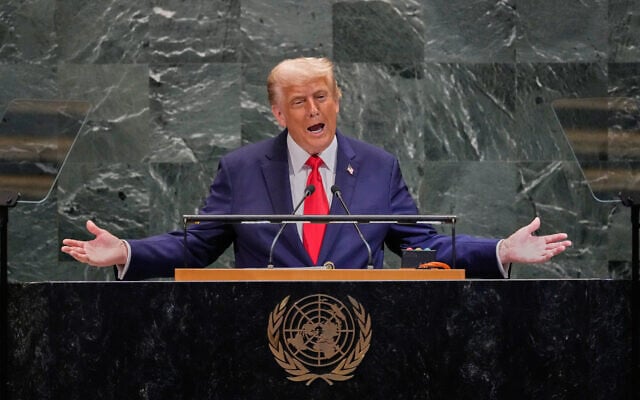


AP — When Prime Minister Benjamin Netanyahu addresses world leaders at the United Nations on Friday, it will be at the helm of a country that is increasingly being treated as a pariah, even by some of its longtime allies.
Western countries are outraged by Israel’s intensifying offensive in the Gaza Strip and several have recognized Palestinian statehood. The European Union is weighing tariffs and sanctions.
Democratic voters in the United States have expressed disgust in polls, and small cracks are showing in Republican support. The prospect of sports and cultural boycotts is growing, and Israeli tourists have been made to feel unwelcome in some countries.
Even Netanyahu’s flight to New York on Thursday was fraught. An unplanned landing in Europe could have exposed him to arrest on charges of crimes against humanity filed by the International Criminal Court, which he denies. The flight took a longer, alternate path to avoid some European airspace, in what may have been an effort to avoid problems related to the ICC warrant.
Netanyahu still seems to have the unwavering support of US President Donald Trump, and the US has done much to shield Israel from censure. But as its latest invasion of Gaza City puts Trump’s hoped-for ceasefire further out of reach, and as some on the right express outrage, that too could change.
“The concern is that there’s a tipping point out there,” said Michael Oren, a historian and former Israeli ambassador to the US. “We’re not a pariah state yet, but we could be.”

Last month, 28 Western-aligned countries that had rallied around Israel after Hamas’ October 7, 2023, attack, which killed some 1,200 people and saw another 251 taken hostage, called on it to end its offensive, which has killed tens of thousands of Palestinians.
They also criticized Israel’s restrictions on humanitarian aid, which have contributed to dire conditions that a UN agency has classified as a famine, findings that Israel disputes.
Ten countries, including Britain, France, Canada and Australia — recognized Palestinian statehood this week, hoping to revive the long-moribund peace process, a move that the US and Israel have vehemently rejected as a “reward” for Hamas. Germany, one of Israel’s closest allies, has not joined the calls for a ceasefire or the push for Palestinian statehood, but has halted some military exports.
Several Arab states, including some with longstanding relations with Israel, have accused it of committing genocide in Gaza, as have leading genocide scholars, UN experts and some Israeli and international rights groups. The UN’s highest court, the International Court of Justice, is weighing genocide allegations raised by South Africa that Israel also vehemently denies.

Netanyahu acknowledged the country’s isolation in a speech last week, saying Israel might have to become a self-sufficient, militarized “Super Sparta.” He backtracked the next day after the Tel Aviv Stock Exchange took a dive.
“This is a bitter fact that has begun to spread like a bushfire beyond the sphere of diplomatic relations,” Itamar Eichner wrote in Israel’s Yediot Ahronot daily. “Israel is already becoming an ostracized country.”
Trump has stood by Israel through it all, applying no public pressure after it ended a ceasefire he had helped broker earlier this year; or when it cut Gaza off from food and medicine for several weeks, or when it invaded Gaza City earlier this month.
Trump aired his displeasure after Israel’s strike on Hamas leaders in Qatar derailed negotiations aimed at a ceasefire and hostage release. But there was no daylight seen between the two allies when Secretary of State Marco Rubio visited Israel days later.
The administration has meanwhile imposed sanctions on ICC judges and prosecutors, cracked down on pro-Palestinian, anti-Israel protests on college campuses, shielded Israel from UN calls for a ceasefire and provided billions of dollars worth of arms — continuing the Biden administration’s massive military support.

US public opinion polls over the past year raise doubt over how long such support will last.
About half of Americans say Israel’s military response in Gaza has “gone too far,” according to a survey from The Associated Press-NORC Center for Public Affairs Research. That’s up from November 2023, shortly after the start of the war, when 40 percent said it had.
A recent poll by the University of Maryland found that nearly half of Democratic voters sympathize more with the Palestinians, compared to just 6% who sympathize more with Israel. The survey of 1,514 Americans was carried out July 29-August 7 and had a margin of error of 2.9 percentage points.
The same poll found a growing divide among Republicans, with younger people showing far less support for Israel. While 52% of Republicans aged 35 and older said Israel’s actions in Gaza were justified under the right to self-defense, just 22% of Republicans aged 18 to 34 agreed.

Evangelical Christian Republicans, a bulwark of support for Israel, showed a smaller but significant divide, with 59% of older respondents and 36% of younger respondents saying Israel’s actions were justified.
“This is unprecedented, and I say that as someone who’s been doing research on this issue for decades,” said Shibley Telhami, the professor who authored the survey.
He said the polls indicate a “paradigmatic shift” is underway, comparable to the souring toward foreign intervention after the wars in Vietnam and Iraq.
“We have a Gaza generation, and I think this Gaza generation doesn’t trust Israel, sees Israel as a source of a problem, sees what’s happening in Gaza largely to be genocide. And I don’t think that’s likely to change once the war ends,” he said.
There’s no indication that any of this has chastened Israeli leaders. Netanyahu says Israel is waging a lawful war of self-defense in response to the October 7 attack, chalking up the criticism to antisemitism and Hamas propaganda.
Last month, Israel approved a major settlement project that could split the West Bank in half and that its Western allies — including past US administrations — had long opposed. Netanyahu has hinted he might annex parts of the territory in response to Western countries recognizing a Palestinian state.
“When the Western world is condemning us, our reaction is not to give in, but to dig our heels in deeper,” said Oren, the former ambassador. “There are some things that Israel just cannot do or will not do to ameliorate its international standing: For example, creating a Palestinian state which would fall to Hamas within 24 hours.”

Israel’s increasingly frustrated allies warn of the opposite — that if it continues to rule over millions of Palestinians who are denied basic rights, it will have to choose between some form of apartheid or a binational state in which Jews may not be a majority.
“The approach of your government, some ministers especially, is to destroy the possibility of a two-state solution,” French President Emmanuel Macron said last week in an interview with an Israeli TV network. “It’s the last minute,” he said, before such a solution becomes “totally impossible.”
Times of Israel staff contributed to this report.

